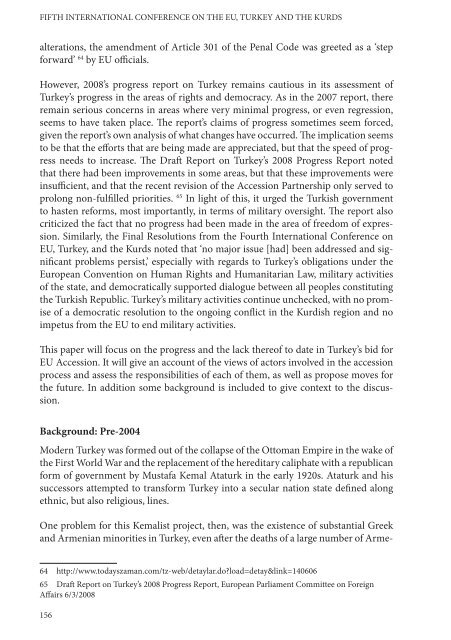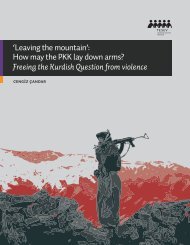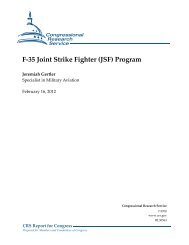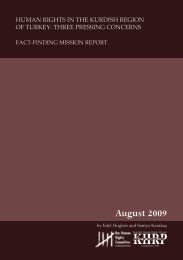FIFTH INTERNATIONAL CONFERENCE ON THE EU TURKEY AND THE KURDS
fifth international conference on the eu, turkey and the kurds
fifth international conference on the eu, turkey and the kurds
You also want an ePaper? Increase the reach of your titles
YUMPU automatically turns print PDFs into web optimized ePapers that Google loves.
<strong>FIFTH</strong> <strong>INTERNATI<strong>ON</strong>AL</strong> <strong>C<strong>ON</strong>FERENCE</strong> <strong>ON</strong> <strong>THE</strong> <strong>EU</strong>, <strong>TURKEY</strong> <strong>AND</strong> <strong>THE</strong> <strong>KURDS</strong><br />
alterations, the amendment of Article 301 of the Penal Code was greeted as a ‘step<br />
forward’ 64 by <strong>EU</strong> officials.<br />
However, 2008’s progress report on Turkey remains cautious in its assessment of<br />
Turkey’s progress in the areas of rights and democracy. As in the 2007 report, there<br />
remain serious concerns in areas where very minimal progress, or even regression,<br />
seems to have taken place. The report’s claims of progress sometimes seem forced,<br />
given the report’s own analysis of what changes have occurred. The implication seems<br />
to be that the efforts that are being made are appreciated, but that the speed of progress<br />
needs to increase. The Draft Report on Turkey’s 2008 Progress Report noted<br />
that there had been improvements in some areas, but that these improvements were<br />
insufficient, and that the recent revision of the Accession Partnership only served to<br />
prolong non-fulfilled priorities. 65 In light of this, it urged the Turkish government<br />
to hasten reforms, most importantly, in terms of military oversight. The report also<br />
criticized the fact that no progress had been made in the area of freedom of expression.<br />
Similarly, the Final Resolutions from the Fourth International Conference on<br />
<strong>EU</strong>, Turkey, and the Kurds noted that ‘no major issue [had] been addressed and significant<br />
problems persist,’ especially with regards to Turkey’s obligations under the<br />
European Convention on Human Rights and Humanitarian Law, military activities<br />
of the state, and democratically supported dialogue between all peoples constituting<br />
the Turkish Republic. Turkey’s military activities continue unchecked, with no promise<br />
of a democratic resolution to the ongoing conflict in the Kurdish region and no<br />
impetus from the <strong>EU</strong> to end military activities.<br />
This paper will focus on the progress and the lack thereof to date in Turkey’s bid for<br />
<strong>EU</strong> Accession. It will give an account of the views of actors involved in the accession<br />
process and assess the responsibilities of each of them, as well as propose moves for<br />
the future. In addition some background is included to give context to the discussion.<br />
Background: Pre-2004<br />
Modern Turkey was formed out of the collapse of the Ottoman Empire in the wake of<br />
the First World War and the replacement of the hereditary caliphate with a republican<br />
form of government by Mustafa Kemal Ataturk in the early 1920s. Ataturk and his<br />
successors attempted to transform Turkey into a secular nation state defined along<br />
ethnic, but also religious, lines.<br />
One problem for this Kemalist project, then, was the existence of substantial Greek<br />
and Armenian minorities in Turkey, even after the deaths of a large number of Arme-<br />
64 http://www.todayszaman.com/tz-web/detaylar.do?load=detay&link=140606<br />
65 Draft Report on Turkey’s 2008 Progress Report, European Parliament Committee on Foreign<br />
Affairs 6/3/2008<br />
156





